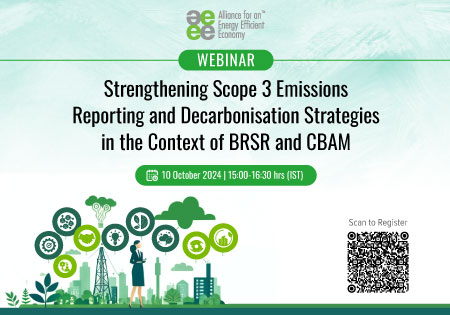Date:10 October 2024
Time:15:00 – 16:30 hrs (IST)
Background
In today’s sustainability landscape, Scope 3 emissions are crucial for organisations aiming to achieve comprehensive carbon management. Unlike Scope 1 and Scope 2 emissions, Scope 3 emissions encompass the entire value chain, including upstream and downstream activities. Given their indirect nature, Scope 3 emissions are often the most challenging to measure, report, and mitigate. However, with increasing regulatory demands, such as India’s Business Responsibility and Sustainability Reporting (BRSR) and the European Union’s Carbon Border Adjustment Mechanism (CBAM), it is imperative for organisations to strengthen their Scope 3 emissions reporting and develop robust decarbonisation strategies.
Scope 3 emissions, identified by the Greenhouse Gas (GHG) Protocol, include emissions from purchased goods and services, capital goods, transportation, waste, business travel, employee commuting, leased assets, and more. BRSR mandates detailed reporting on these emissions, while CBAM imposes a carbon tax on imported goods based on their carbon footprint, encouraging companies to meet stringent carbon standards and enhance their emissions reduction efforts.
To manage Scope 3 emissions effectively, organisations should focus on accurate data collection and measurement, leveraging standardised methodologies like the GHG Protocol. Transparent reporting aligned with BRSR and CBAM guidelines, using digital tools for data management, is crucial. Decarbonisation strategies should involve setting ambitious yet achievable targets, collaborating with suppliers, investing in sustainable technologies, and implementing circular economy principles. Despite challenges in data availability and the high costs of decarbonisation, opportunities exist in enhancing corporate reputation, gaining competitive advantage, and achieving cost savings through improved resource management. Addressing Scope 3 emissions is essential for comprehensive sustainability, and this panel discussion will provide a platform for sharing insights, best practices, and actionable solutions.
This panel discussion aims to highlight the significance of Scope 3 emissions in an organisation’s overall carbon footprint, discuss the implications of BRSR and CBAM on Scope 3 emissions reporting, share best practices and strategies for accurate measurement and effective reduction of Scope 3 emissions, explore the challenges and opportunities in decarbonising value chains, and provide actionable insights for organisations to enhance their sustainability efforts.
Agenda
| Topic | Duration |
| Welcome and Introduction | 5 minutes |
| Keynote Address: The Importance of Scope 3 Emissions | 10 minutes |
| Panel Discussion: Navigating BRSR and CBAM Regulations | 55 minutes |
| Q & A | 15 minutes |
| Closing Remarks and Next Steps | 5 minutes |
Who can participate:
- Industry Bodies and Associations
- Think Tanks and NGOs
- Sustainability Professionals
- Students and researchers
